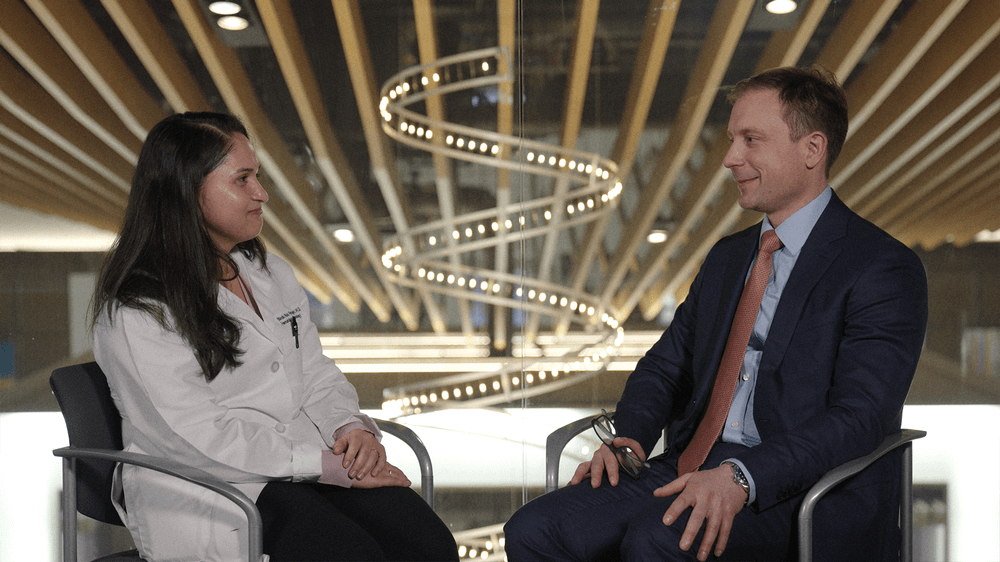Multidisciplinary teams (MDTs) can add value to cancer care by optimizing treatment practices and were associated with improved patient outcomes1,2
Watch how the team at Henry Ford is using MDTs to streamline treatment
MDTs can streamline treatment practices by encouraging use of National Comprehensive Cancer Network® (NCCN®) recommendations3,4,7
NCCN Clinical Practice Guidelines in Oncology (NCCN Guidelines®) and derivative resources provided by NCCN are utilized by CMS and private payers in the development of coverage policies for plans covering ~85% of insured people in the US.7 Adhering to these guidelines can help streamline the insurance process, enabling patients to have access to the care they need in a timely manner.5,6
*Study design: A retrospective study of 176 head and neck tumor patients, identified between March 3, 2010, and October 17, 2012, was conducted to evaluate incorporation of evidence-based NCCN Guidelines in clinical decision-making and the extent to which NCCN Guidelines subsequently translated into patient care.4
MDTs were associated with improved patient outcomes2
Differences were found between the MDT and non-MDT cases with respect to histologic type and stage distribution. Noted imbalances in stage distribution, histologic features, treatment and other variables might have affected the differences in survival outcomes.2
†Study design: This retrospective study investigated all lung cancer cases diagnosed between 2002 and 2016 entered into the Stony Brook University Hospital (SBUH) cancer registry. This study was conducted to compare the short- and long-term survival outcomes of lung cancer patients treated within the MDT program of the Lung Cancer Evaluation Center (LCEC) with those of patients who had received a traditional standard of cancer care. Log-rank tests were used to evaluate differences in survival outcomes between LCEC and non-LCEC patients, stratified by tumor stage.2
NCCN, National Comprehensive Cancer Network; NSCLC, non-small cell lung cancer; OS, overall survival.

MDTs are recommended by NCCN Guidelines®7
- NCCN Guidelines® recommend all appropriate patients be evaluated for preoperative neoadjuvant systemic therapy7
- Neoadjuvant targeted therapy in resectable NSCLC warrants MDT coordination based on the need for extensive knowledge of tumor biology and coordination of immune and molecular biomarker testing8,9
- NCCN Guidelines® for NSCLC recommend MDTs be utilized early in treatment, before establishing a diagnostic strategy due to the multimodal and multispecialty care needed7
MDTs may help optimize and integrate all therapeutic resources, including available treatment options, for patients10
MDTs can successfully be adapted to a virtual environment11
In addition to conventional face-to-face MDTs, virtual MDTs may serve as a viable option for the future of cancer care.
Virtual MDTs can increase participation of specialists due to freedom from geographic limitations. Many widely available video-conferencing platforms may be used to facilitate discussions.11
In a 2020 online survey (N=39) at a tertiary sarcoma center:

3 in 4
MDT participants were satisfied with virtual MDTs11
4 in 5
MDT participants felt that the decision-making in diagnosis had not changed following the switch from face-to-face MDTs11
MDTs, including virtual MDTs, are billable14
| Category14 | CPT Code14 | Description14 |
|---|---|---|
| Medical team conference, direct (face-to-face) contact with patient and/or family | 99366 | Medical team conference with interdisciplinary team of health care professionals, face-to-face with patient and/or family, 30 minutes or more, participation by non-physician qualified health care professional |
| Medical team conference, without direct (face-to-face) contact with patient and/or family | 99367 | Medical team conference with interdisciplinary team of health care professionals, patient and/or family not present, 30 minutes or more, participation by physician |
| 99368 | Medical team conference with interdisciplinary team of health care professionals, patient and/or family not present, 30 minutes or more, participation by nonphysician qualified health care professional |
The accurate completion of reimbursement – or coverage – related documentation is the responsibility of the healthcare provider and patient. Bristol Myers Squibb and its agents make no guarantee regarding reimbursement for any service or item.
CPT, Current Procedural Terminology; MDT, multidisciplinary team.


